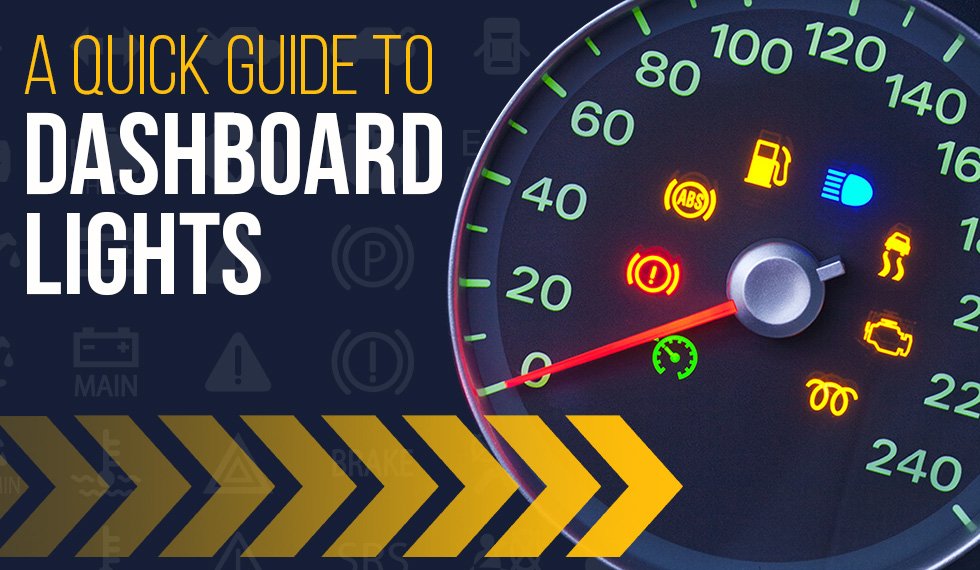On your car’s dashboard is a wealth of information that can help you keep your car in the best shape possible. However, sometimes, that information can be difficult to understand if you’re not familiar with the common dashboard warning lights. You might notice a light comes on and assume it’s nothing, only to discover it was a sign you should take your car in right away.
This guide will help you understand just some of the common dashboard warning lights you might find light up as you drive down the highway.
Washer Fluid

The washer fluid icon is one of the few lights you don’t have to worry too much about. In most cases, it will look like a windshield with a jet of water. This light indicates that your washer fuid is low and needs to be refilled. This isn’t a huge pressing concern unless you find yourself driving down dirt roads that would leave your visibility hindered if you cannot wipe the grime away.
Low Fuel

Another light that isn’t as pressing if you’re in the right position is the low fuel light. Appearing as a fuel pump, this indicates that you’re low on gas. If this light appears, you should start looking out for the next gas station to fuel up or you might find yourself running on empty.
Battery Warning Light

Shaped like the silhouette of a battery with a minus and plus sign on each end, this dashboard light tells you that there may be something wrong with the battery, as the vehicle’s charging system is not functioning properly. This may be a problem with the wiring (indicating a corroded or loose wire), or it could be an electrical issue within the battery.
Sometimes this light does turn on when you first start your car. This is normal. However, if you find the light stays illuminated or turns on as you drive, it’s important to take your car into an auto repair shop to make sure nothing is wrong with the battery.
Tire Pressure Monitoring System

This light is often depicted as a tire with an exclamation mark at the center. This indicates that your tire is underinflated. Some more high-tech cars can even tell you which of your tires are in need of air.
Should you notice this light turn on, you should inspect your tires to determine which are low in pressure and determine if there are any punctures. If no punctures are found, stop by a service station and inflate your tires up to adequate pressure. Sometimes this sensor can come on because of seasonal changes, but in most cases, it can be an indication of a flat.
If a puncture is found, change the affected tire to your spare and take your car in for a replacement.
Brake System

This is either a circle with a P in the middle or the written word “brake”. In most scenarios, this light being illuminated is an indication that your parking brake is on. If you know your parking brake is off and you see this illuminated, then it means that something is wrong with your brakes.
If that is the case, you will need to bring in your car to have your brakes inspected. This could indicate worn brake pads or low brake fluid levels, among other common issues.
Anti-Lock Braking System

Though this may sound similar to the above, this symbol is slightly different in both appearance and meaning. This is a circle with ABS in the center. The anti-lock braking system allows you to better brake in the event of slippery roads. Often times this light coming on is not as indicative of immediate danger as the brake light coming on, but it is something to be sure of. Taking your car in is advised.
Transmission Temperature

This symbol is one of the most varied. You may see a gear with a thermometer in the center. You may see just a thermometer in liquid. You may even see the words “AT OIL TEMP”. Whatever it is you see, this symbol is indicative that your transmission is running too hot. It’s necessary in this case to pull over to the side and let your transmission cool down by turning off the car. This could indicate that your fluids or low, that something is worn, or simply that you have been overtaxing your transmission.
Check Engine Light

One of the most concerning lights to see is going to be the check engine light. Either shaped in the silhouette of an engine or written out in text, this light is the vaguest but most pressing of any other light. This means there has been a problem detected with your engines.
While it might be a faulty light or a minor issue, the chances of it being a major problem make ignoring it a huge risk. If you see your check engine light come on and stay on, it’s important you bring it in so a trained technician can check your car’s engine for any issues.
In the event one of these more serious dashboard warning lights turns on, your next step should be to bring your car in to get serviced. We offer a range of services from transmission service, engine replacement, brake inspection, and many other services.
Our ASE certified technicians are equipped to handle all major and minor auto repair services on domestic and foreign vehicles.






